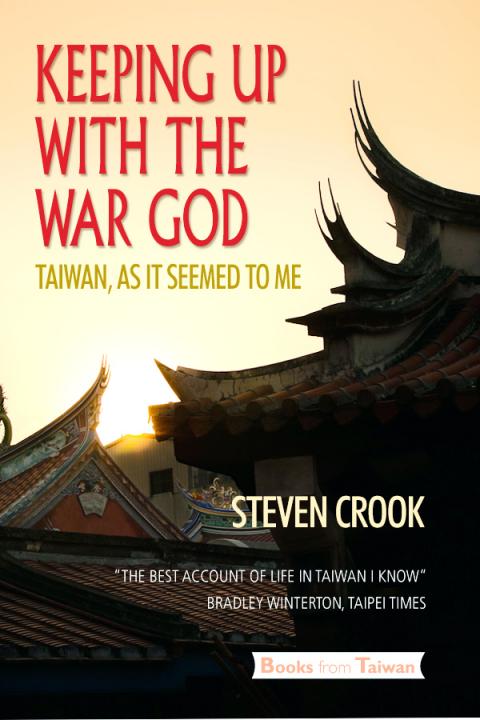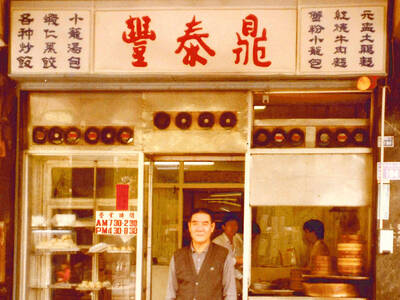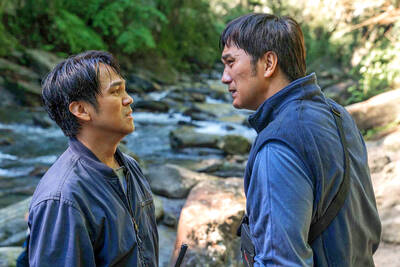Search Amazon.com for “Taiwan” and you will find almost nothing other than guidebooks, academic histories and political studies.
“It’s a tragedy that so few books have been written about Taiwan,” says New Zealander expatriate John Ross, author of Formosan Odyssey (reviewed in the Taipei Times on July 7, 2002). “The country has such an interesting history, geography, political situation, and culture … You could spend a lifetime writing about Taiwan and not run out of material.”
To remedy what he sees a dearth of literature, Ross has organized an English-language book festival, which takes place this weekend at Alleycat’s Pizza in Taipei’s Huashan 1914 Creative Park (華山1914).

Photo Courtesy Steven Crook
The aim is to “provide a place where authors and readers can sell and buy books and, hopefully, encourage more foreign residents to write about Taiwan,” Ross says.
Presentations and group discussions will be led by established authors in Taiwan, such as Jerome Keating (Islands in the Stream: A Quick Case Study of Taiwan’s Complex History and Taiwan: The Search for Identity), Syd Goldsmith (Jade Phoenix), and Steven Crook (Taiwan: The Bradt Travel Guide, Do’s and Don’ts in Taiwan and Keeping Up With the War God).
The focus of the presentations will not be on how to get work picked up by publishing houses, but on self-publishing. “Other than textbooks, the market for English-language books is very small,” Ross says. “Self-publishing, however, is becoming easier, and Taiwan is a great place to do it.”
Several of the festival’s featured authors have self-published books. Other speakers include prominent bloggers, such as Carrie Kellenberger (freelance writer and editor and owner of www.MySeveralWorlds.com, currently one of the most successful travel blogs in the world), Craig Ferguson (professional photographer and blogger at www.CraigFergusonImages.com), and David Reid (freelance writer and blogger at www.blog.taiwan-guide.org). There will be discussions on citizen journalism and how to make money by writing online.
Though this is the festival’s first edition, Ross has high hopes. In the future, he aims “to broaden the focus of the festival to include Taiwanese book lovers, get publishers involved, and invite some foreign guest authors to Taiwan for the event.”

March 24 to March 30 When Yang Bing-yi (楊秉彝) needed a name for his new cooking oil shop in 1958, he first thought of honoring his previous employer, Heng Tai Fung (恆泰豐). The owner, Wang Yi-fu (王伊夫), had taken care of him over the previous 10 years, shortly after the native of Shanxi Province arrived in Taiwan in 1948 as a penniless 21 year old. His oil supplier was called Din Mei (鼎美), so he simply combined the names. Over the next decade, Yang and his wife Lai Pen-mei (賴盆妹) built up a booming business delivering oil to shops and

Indigenous Truku doctor Yuci (Bokeh Kosang), who resents his father for forcing him to learn their traditional way of life, clashes head to head in this film with his younger brother Siring (Umin Boya), who just wants to live off the land like his ancestors did. Hunter Brothers (獵人兄弟) opens with Yuci as the man of the hour as the village celebrates him getting into medical school, but then his father (Nolay Piho) wakes the brothers up in the middle of the night to go hunting. Siring is eager, but Yuci isn’t. Their mother (Ibix Buyang) begs her husband to let

The Taipei Times last week reported that the Control Yuan said it had been “left with no choice” but to ask the Constitutional Court to rule on the constitutionality of the central government budget, which left it without a budget. Lost in the outrage over the cuts to defense and to the Constitutional Court were the cuts to the Control Yuan, whose operating budget was slashed by 96 percent. It is unable even to pay its utility bills, and in the press conference it convened on the issue, said that its department directors were paying out of pocket for gasoline

On March 13 President William Lai (賴清德) gave a national security speech noting the 20th year since the passing of China’s Anti-Secession Law (反分裂國家法) in March 2005 that laid the legal groundwork for an invasion of Taiwan. That law, and other subsequent ones, are merely political theater created by the Chinese Communist Party (CCP) to have something to point to so they can claim “we have to do it, it is the law.” The president’s speech was somber and said: “By its actions, China already satisfies the definition of a ‘foreign hostile force’ as provided in the Anti-Infiltration Act, which unlike